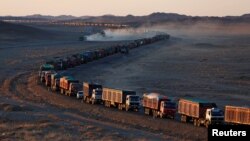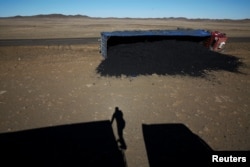In Mongolia’s Gobi desert, thousands of heavy-duty trucks laden with coal inch along a cluttered highway toward the Chinese border in a journey that can take more than a week.
Truckers cook, eat and sleep in vehicles covered in coal dust, many subsisting on the same meat soup that fueled Genghis Khan’s Mongol Horde more than eight centuries ago.
Alongside the trucks a bustling microeconomy has sprung up of traders peddling cigarettes, water and diesel as drivers wait to clear Chinese customs in a queue that can stretch for 130 kilometers (80 miles).
A rebound in coal prices and a surge in exports to China this year has meant a bonanza for miners in Mongolia, and a vital lifeline for the country’s tiny economy, after a currency and debt crisis forced it to seek an economic rescue package from the International Monetary Fund (IMF).
Border chokepoint
But long delays at the Gashuun Sukhait-Gants Mod crossing, the main transit point between the two countries, are undercutting those gains as fleets of trucks carrying coal from Gobi desert mines to China pile up at the border.
The long delays have been blamed on a surge in traffic driven by the thriving cross-border coal trade. However, Mongolia’s inability to stop rampant smuggling across the border has also played a role as China has imposed more stringent checks on incoming deliveries in recent months.
Customs officials in China’s Inner Mongolia declined to comment when contacted by Reuters. The General Administration of Customs in Beijing also did not respond to requests for comment.
Coal prices, exports up
The rise in coal prices this year has doubled border traffic, according to local police, putting law enforcement and customs staff under heavy pressure in both China and Mongolia.
With Gobi miners hoping to boost output further next year in a bid to take advantage of higher prices in China, the bottlenecks are expected to get worse.
An environmental crackdown in China has resulted in the closure of hundreds of mines and the restriction of coal deliveries into smaller ports, driving up prices.
Curbs on coal imports from North Korea as a result of international sanctions against Pyongyang’s nuclear weapons program have also allowed Mongolia to fill the breach.
Mongolia’s coal exports to China rose more than four-fold in the first half of the year, but growth has petered out since the delays at the border crossings first arose in July.
Bataa Davaasuren, director of Mongolia’s Customs House at Gashuun Sukhait, said customs on both sides of the border were short-staffed, adding that the situation had been exacerbated by events like the Chinese Communist Party Congress in October.
Mongolia’s Foreign Affairs Ministry said the problem was initially caused by the Naadam summer festival, when many Mongolians take long holidays.
Smuggling a problem
Mongolian customs officers are also taking more time to screen cargoes after their Chinese counterparts complained that raw meat and even guns had been secreted in coal heading to China, Davaasuren said.
There was even one incident when a driver tried to sneak a live wolf across the border, he said.
“Nobody wants the long queue, of course,” said Davaasuren, who said the problem would quickly disappear if Mongolian customs could raise its handling capacity to 3,000 trucks a day from 700 currently. “It’s bad for the drivers and the country, so we’re all working to resolve the issue.”
Harrowing trip
When trucks aren’t stuck in grinding traffic, just getting to the border is also a harrowing ordeal, as vehicles speed toward China and back down the one-lane road. With no street lamps to guide the way and drunken driving a constant problem, danger levels increase at night, drivers say.
“It’s very risky,” said one driver, who identified himself as Bat-Erdene. “We see flipped-over cars on the side of the road every day.”
On a recent trip down the road, a team of Reuters journalists saw numerous overturned trucks and vehicles smashed up from head-on collisions littering the side of the road.
“We see unbelievable things,” said Dunshig Baasanjav, a driver standing outside his truck amid the motionless traffic.
“Others who see it would think it’s the worst they’ve ever seen, but we see it all the time. We’re numb to it.”
Rail link the answer
Miners say the long-term solution to the border bottleneck problem is a new rail link connecting mines with the Gashuun Sukhait crossing.
Mongolia built more than 200 kilometers of foundations for railway tracks for the link but the project was put on hold after financing ran dry.
Local authorities believe the project may have to start again from scratch because the foundation blocks have been left at the mercy of Mongolia’s harsh environment for so long.
Whatever the fate of the railroad, those plying the roads from the Gobi to China in stop-and-go traffic have little choice but to keep driving given the lack of opportunities in a country strapped by austerity measures linked to the IMF bailout.
“This job is very risky and life threatening, but we have no other choice,” said Choijiljav Ganbold, a trucker who emerged from his truck as the sun set on the motionless traffic.
“We have nothing else to do.”








